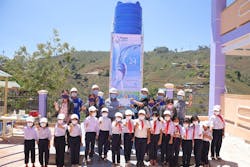Xylem Press Release
undefinedSolutions from global water technology company Xylem helped prevent more than 500 billion gallons of polluted water from flooding communities in 2021, according to its annual Sustainability Report. The report highlights the Company’s work with customers and partners to solve the world’s greatest water challenges. It also details Xylem’s progress to reduce its operational footprint, including cutting Scope 1 and 2 greenhouse gas (GHG) emission intensity by 12 percent and water use by 22 percent, versus 2019.
“It’s a great privilege to have a leading portfolio of technologies and services to help our customers and communities solve the water challenges so central to a more sustainable world,” said Patrick Decker, president and CEO of Xylem. “We have a responsibility to make a difference, working alongside our customers and partners, and the communities we all serve. That’s why our sustainability report is more than a set of numbers. It’s a report card on the difference we’re making, together, and a dashboard of progress in our mission to solve water.”
“Last year, we intensified our efforts around three key areas. First, we’re helping our customers become more effective stewards of their water resources, particularly through our digitally enabled solutions and services. Second, we’re addressing climate mitigation by helping decarbonize the water sector through high-efficiency technologies and our own net-zero carbon commitments. Lastly, we continue to work to advance equitable access to clean water and sanitation around the globe.”
Xylem provides advanced solutions and services that enable utilities, industrial companies and other water consumers to optimize their networks while achieving their own sustainability goals. As one of many examples, in 2021, Xylem’s technologies helped customers reuse more than 285 billion gallons of water. Building on its work to accelerate the decarbonization of the water sector, the Company’s solutions helped customers reduce their carbon footprint by 0.73 million metric tons of CO2.
Last year, Xylem formalized its commitment to achieve net zero carbon emissions across its own value chain before 2050. In addition to reducing its Scope 1 and 2 net GHG emission intensity by 12 percent, Xylem is now running more than half its major facilities on 100 percent renewable electricity. In 2021, the Company embarked on a fleet electrification program which delivered a 31 percent reduction in fleet GHG emissions in Europe in its first year of the program, and cut fleet GHG emissions in the US by 19 percent.
In 2021, amid intensifying severe weather events, Xylem increased its humanitarian support for communities impacted by water-related disasters, providing expertise, technology and equipment to more than 15 countries. Xylem reached 1.4 million people with water education, in large part driven by the launch of a new three-year partnership with UNICEF in India.
“2021 was a year in which we continued to operationalize our sustainability commitments throughout the organization,” said Claudia Toussaint, Xylem’s Chief People and Sustainability Officer. “We built more robust internal reporting and controls, established subject matter expertise across functional areas like product development, operations and supply chain, and integrated sustainability into all that we do — from factory floor to the boardroom. Crucially, we also took steps to structure our workplace in a way that best supports the personal and professional growth of our diverse, 17,000-strong team – the driving force in our mission to solve water.”
Other key highlights detailed in the report, and driving progress toward Xylem’s 2025 sustainability goals, include:
- Engaged nearly 6,000 diverse global youth in water innovation programs such as Xylem Ignite and Stockholm Junior Water Prize, fostering the next generation of water sector talent;
- Contributed 113,000 employee volunteer hours, with 78 percent of employees participating in activities to solve water in their local communities; and
- Engaged 400 suppliers in the WASH4WORK pledge for access to safe water, sanitation and hygiene (WASH).






